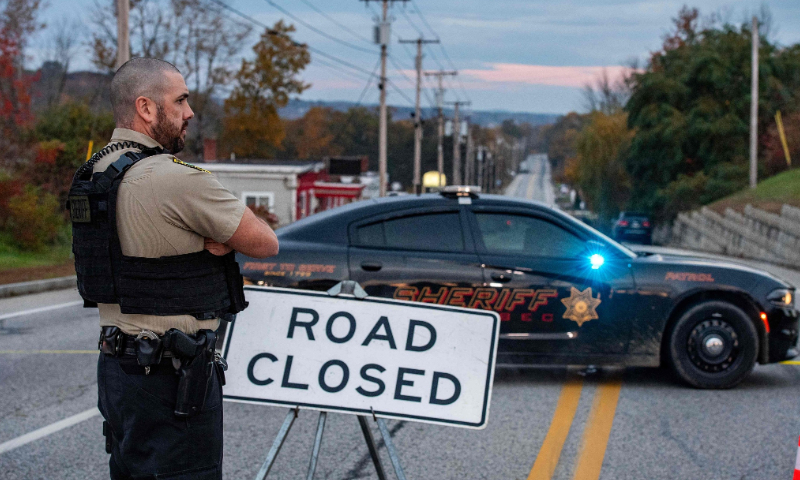Washington, searching for ‘security threats,’ should take a look at Maine: Global Times editorial
Maine #Maine

Washington, searching for ‘security threats,’ should take a look at Maine: Global Times editorial

Police presence at Schemengees Bar where a mass shooting occurred on October 25 in Lewiston, Maine. Photo: VCG
The mass shooting incident in Maine in northeastern US on the evening of October 25 has sent shockwaves throughout the country. It has resulted in at least 18 deaths and injuries to another 13 people. This is the deadliest shooting incident in the US this year and one of the deadliest shooting incidents in the US in the past few decades. The White House has ordered to lower the flag to half-mast. What has further terrified the local residents is that, although the suspect has been confirmed to be a 40-year-old officer in the US Army Reserve, he is still at large as of press time, which means that a significant threat to public safety has not been eliminated.
Maine is often in the spotlight for its abundant production of blueberries and lobsters, and its thriving tourism industry. Its governor said at a press conference on Thursday that Maine “has long been known as one of the safest states in the nation.” For Maine to make headlines this way has added an extra layer of shock for the American people. The motive of the shooter is still unclear, as each shooting incident has different circumstances and motivations. However, there are common backgrounds and larger contexts, or the underlying conditions that lead to such shooting incidents. One long-discussed backdrop in the US is the widespread availability of firearms and lax gun control. This is a systemic issue that the US has been unable to resolve, contributing to the difficult-to-bridge societal divides.
Today, issues in the US, including gun control, have become synonymous with partisan conflict. The two major political parties refuse to compromise on gun control, to the point where, for some conservative Republican politicians, supporting gun rights has become a requirement to prove their credentials to voters. When firearms become “symbols of order and totems of conservatism,” their discussion is no longer about solving problems but rather a convenient tool for politicians to sow discord and stoke hatred in order to garner support from their constituents.
The Maine shooting incident is likely to become the latest material for the ongoing debate and attacks between the pro-gun and gun control advocates. The expected outcome is that after a flurry of public outcry, it will eventually fade away until the next large-scale shooting incident occurs, starting the cycle anew. Many Americans have become numb to this, and they do not hold much hope for change. Today, we would like to discuss another background that is often overlooked by the American public discourse, which may be more important and fundamental. In comparison to the stagnant debate between the pro-gun and gun control camps, there is much more work that the US can and should do on this issue.
In simple terms, the US government needs to take strong actions domestically to combat hate speech and hate crimes, while also reducing hostility and aggressive narratives internationally. Both of these issues have become very serious, and when combined, they shape an extremely polarized social atmosphere in the US, leading to sharper and more intensified social divisions. The US is a nation with diverse ethnic groups and cultural richness. When it fosters a climate of hatred and hostile rhetoric by creating imaginary enemies, it’s essentially planting landmines in its own backyard.
For instance, the US’ biased and unjust stance on the Israeli-Palestinian conflict has led to a significant increase in related hate crimes in the past two weeks. Also, the US government’s irresponsible blame-shifting during the COVID-19 pandemic has resulted in a substantial rise in attacks against Asian communities, and so on.
The bullets fired from guns are what cause deadly harm, but it’s individuals who pull the trigger, and what factors have driven these individuals to harm innocent people? This is what the American society needs to reflect upon. This is a tractable issue. In recent years, the high frequency of mass shootings in the US has coincided with the country’s official intensification of aggressive actions internationally. This is not a mere coincidence; there is evidently an inherent connection. Adversarial thinking and behaviors are quite popular in Washington, and they cannot help but have a negative impact and backlash on American society.
For Washington, which is inclined to talk about “security” and seek out “threats” everywhere, the real security threat is right under its nose. Looking for external enemies is fundamentally misguided.
The phrase “another shooting in the US” may no longer be considered “news” to many people today, which is a tragic reflection of the state of American politics and society. According to incomplete statistics, over 35,000 Americans have died from gun violence this year alone. Even if the US had participated in a regional war, it is unimaginable that such a high number of annual casualties would happen. While the US constantly talks about external threats and seeks out imaginary enemies, every innocent life lost to a shooting serves as a warning, reminding the country of its true threats. The disregard for this warning is a great disservice to those innocent lives.